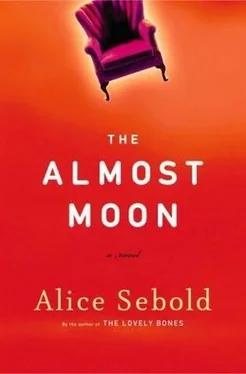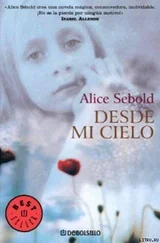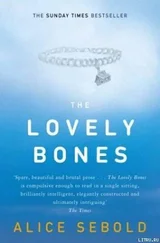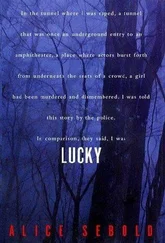I looked exactly as I had the day before, but there was something behind my eyes I couldn’t name. It was not fear or even guilt. I shifted my body slightly so one of the mirror’s wear marks-a black dot with a wavy black circle surrounding it-was positioned exactly in the center of my forehead. Bang-bang.
I had not seen Jake in almost three years, since shortly before Leo was born. He had touched my nose with his index finger and said, “A true button. I’ve never known anyone else with a button nose! Jeanine has it too.”
“Yes,” I said. “And your hazel eyes.”
“I’m hoping this one gets your blue.”
We had stood, looking at each other, until John came out of the bedroom where Emily was under strict orders to stay in bed.
“Am I interrupting something?” he asked.
“We were just fighting over who has more gray hairs,” Jake said.
“That’s easy,” John said, with the humor of a pear. “Helen does.”
My hair had begun to silver years ago, in my late thirties. I’d thought long and hard before coloring it. There was something sad to me about saying good-bye to my original color by dyeing it and keeping it dyed. In opting to wear it very short, I sometimes felt I resembled a stick woman in a black skullcap.
Jake was standing outside the back door, holding a brown leather backpack. I could see him through the half pane as I approached, tapping his fingers against the leather strap, a habit of his-finger tapping, foot wiggling, knuckle cracking-that had driven me mad by the end of our marriage. But it seemed reassuring somehow. He still had the same nervous energy he’d had so many years ago.
I unlatched the bolt and drew the door open toward me.
We stared at each other.
He had aged in a good way. The way wiry men who seem unconcerned with their appearance but who have deep habitual hygiene and exercise habits age. Stealthfully. At fifty-eight, he had salt-and-pepper hair but still appeared to be in fighting trim.
“I’ve been to the house,” he said. “Why did you move her?”
I gasped. He stepped over the threshold and took the door away from my hands, shutting it firmly and bolting it.
“How?”
“You left the living room window in back unlocked. I didn’t know if you were inside or not, so I climbed onto the grill and popped the screen. Helen,” he said. He looked right at me, there in the tiny hallway. “What have you done?”
“I don’t know. You were talking about rot, and I thought, Freezer. ”
“You killed someone,” he said, enunciating each word as if I couldn’t understand. He looked angry enough to strike me.
I backed into the laundry room. He had never hit me. He was not the hitting type or even one to raise his voice. He reasoned. He analyzed. At worst, he stewed.
He had conditioned himself to going gloveless in the cold of Wisconsin years ago. I saw his ruined thumb and finger, where the nails had become permanently discolored.
“What did you think putting her in the freezer would achieve?”
“I don’t know,” I said. I could feel the shelf I kept the laundry supplies on gouging into my back. “I don’t know.”
He came forward, and I flinched. “Don’t be afraid.” He took one of my arms in his hand and pulled me away from the wall. A box of softener sheets fell to the floor. “Come here,” he said.
And then he encased me. Encased me in a way the thirty-year-old Hamish never could. There was history and knowledge and even, as amazing as it was, compassion in this embrace. I thought of how he would talk about his work as ephemeral, and that all things were ephemeral when it came down to it, even relationships.
“I don’t know what I’m going to do,” I said. I let myself lean, for a moment, against his rough gray coat. “I should have called someone, but I didn’t.”
Ever so gently he removed the backpack from his shoulder and placed it on the dryer.
“You called me,” he said.
I kept my head burrowed into his chest even though I could feel him wanting to pull back and look at me. I did not want to be looked at by anyone. I could not believe what I had done, but at the same time, inside me, like a kernel just beginning to grow, I felt justified. No one-not even Jake, who could conceive of it better than anyone-knew what my life with my mother had become.
“I couldn’t do it anymore,” I said. He put his hands on my shoulders and forced me to look at him. I was crying in a hideous leaking sort of way. I had forgotten, as the years passed and our conversations were had only over the phone, me always in Pennsylvania and him in one city after another, how kind his face could be. I saw the gentleness that Emily had grown so close to. I saw the man Jeanine and Leo called “Big Dad,” and whom, for obvious reasons, they preferred to me.
“Oh, Helen,” he said. He put his hand to my cheek. “My poor Helen.”
He kissed me on the top of my head and then held me against him, rocking me. We stayed that way for a long while. Long enough for the light outside to go from deep to light blue. Long enough for the first bird of dawn to be joined by a chorus. Only Jake could get away with saying such things to me.
When we pulled apart, he suggested coffee, and we moved down the long back hallway, on the wall of which I kept a map of the world that had once been my father’s. Over the years, the countries at shoulder height had been rubbed raw by the accidental brushing of my winter coat whenever I left through the garage. I spied the just-spared Caracas out of my left eye.
My father had brought the map over two weeks before he shot himself. “Why now?” I’d asked him. He smiled as Emily came to greet him. Every man, even her grandfather, a secret disappointment to her in those first years away from Jake. “So that Emily and Sarah can learn their geography!” he’d said.
I turned on the lights in my kitchen. They were recessed and supposed to be better than old-fashioned overheads, but the slight broken-filament sound they always made as they heated up had never failed to disturb me. I went to the long counter and pulled the coffeemaker away from the wall. I wanted to talk about something besides my mother.
“Who are you working for in Santa Barbara?” I managed.
“Some computer guy,” he said.
Jake came and stood close beside me, as if we were two line workers on a conveyor belt. He took the glass pot from my hands and turned on the faucets of the sink to rinse it out. I tossed the old grounds out and replaced the filter.
“He has homes in about a dozen places. Actually, Avery was the one who hooked me up. He’s friends with this guy’s acquisitions rep.”
“Acquisitions rep?”
After handing me the pot, Jake turned and leaned against the counter. I spooned in the coffee, keeping my mind on the count.
“Are you sure you want to hear about this?”
I nodded my head.
“It’s a whole new world. I do more and more private commissions. It beats the teaching. I like to say I burned out in Bern.”
“So, you’re a whore,” I said.
“Now that’s my Helen.”
I smiled at him weakly. “Thank you.”
“My flip-flop artist,” he said. He took a cursory look around. It had been eight years since he’d stood in my kitchen. In a quick moment during a party, we had had a private toast to Sarah, who had graduated high school that day by the skin of her teeth.
I snapped in the filter and turned on the switch.
I did not look at him but at the counter, at the small golden flecks in the old linoleum. I had never been comfortable asking for help.
He walked over to the kitchen desk, where I paid bills and kept my own records, which was separate from the desk in the living room, where I kept my mother’s, and hung his coat off the back of an old Mexican chair. The coffee gurgled into the pot behind me. I thought of how the roof light of our VW Bug had gone on the night we knew it was over. He was dropping the girls and me at home before going to hang out with a group of teachers. I saw his features briefly, sickly, sadly, and then he closed the door. I stood in front of our small house with Sarah in my arms and Emily holding my hand. “Good-bye, Daddy,” she said. And then I said, “Good-bye,” and so did Sarah. Our words like so many useless cans rattling at the back of the car.
Читать дальше












